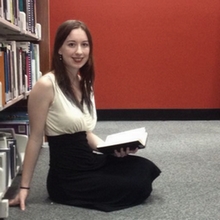
Alayna Cole
Alayna Cole is an MCA (Creative Writing) candidate who loves to write stories when she’s not studying.
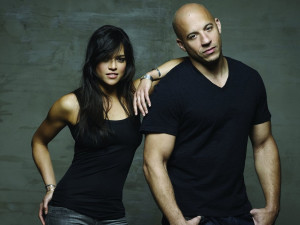 I’m a writer who primarily concerns herself with the page. I’ve found that there are many benefits to favouring written narrative over alternatives like visual and interactive narrative, but there are also many downsides. And, beyond that, there are innumerable differences that cannot necessarily be put into ‘pro’ or ‘con’ categories. This article concerns itself with one of the key differences between my preferred craft and the visual narrative, specifically live action movies and television programmes.
I’m a writer who primarily concerns herself with the page. I’ve found that there are many benefits to favouring written narrative over alternatives like visual and interactive narrative, but there are also many downsides. And, beyond that, there are innumerable differences that cannot necessarily be put into ‘pro’ or ‘con’ categories. This article concerns itself with one of the key differences between my preferred craft and the visual narrative, specifically live action movies and television programmes.
It is possible for an audience to enter any narrative with prior knowledge of either the story itself, or the external factors that shaped it, and this knowledge can skew a person’s perception and interpretation. When watching a live action movie or television programme, an audience can easily be influenced by their understanding of the actors that they see on the screen, which can lead to a conflation of character and actor. For example, I’m fully convinced at this point that Robert Downey Jr. is actually Tony Stark, with Robert’s real life decisions often staying completely in character. Generally this connection between actor and character is a side-note to the story, something unintentional that only causes small biases with particular members of an audience based on their individual prior knowledge; however, I recently watched a movie where this connection seemed to be actively encouraged and this seriously altered the experience of the narrative for many members of the audience.
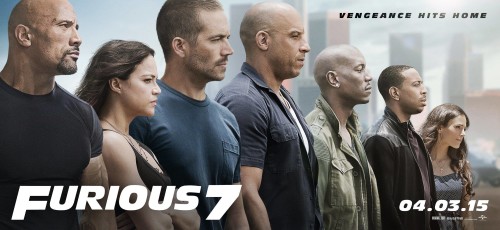
The release of Fast and Furious 7 was surrounded by a lot of hype, following the tragic death of Paul Walker—the actor who plays one of the lead characters, Brian O’Conner—late in 2013.
I hadn’t watched any of the Fast and Furious movies until my partner—a big fan of the series and saddened by Paul’s death—sat me down and showed them to me. I was anticipating action movies that followed the typical conventions of the genre but, although the movies are filled with the highly-implausible action sequences that I was expecting, they also contained many characters that I grew to genuinely care about. When I first heard about Paul’s death, I was saddened by a life being cut too short, but he was simply an actor from a movie franchise that I had no experience of; but after watching the series, he was the man who portrayed a character that I loved and that, according to reports leading up to the release of Furious 7, was about the be ‘retired’ (for obvious reasons).
I went to see Furious 7 the day that it opened in Australia with this knowledge of Paul’s death and his co-stars’ devastating reactions to the news fixed firmly in my mind. It influenced my perception of the narrative in quite apparent ways: from the first moment Brian graced the screen, I was anxiously waiting for his fate to mirror that of Paul. Beyond that, I could see the strong friendship that I knew had existed between Paul and his co-star Vin Diesel, so seeing their characters Brian and Dominic on screen together brought tears to my eyes before the narrative had actively attempted to do so; in watching those scenes, I knew that I was also watching some of the last moments Paul and Vin had spent together, and I was certain that soon Dom would be saying goodbye to Brian in much the same way.
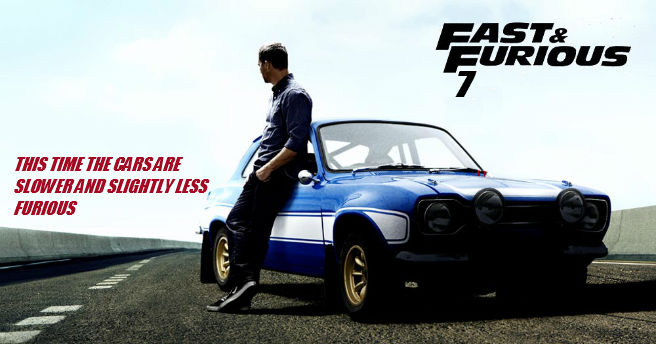 [Story spoilers ahead]
[Story spoilers ahead]
My knowledge that this was the last Fast and Furious movie Brian would feature in altered the way I interpreted the story. I started to see hints and foreshadowing everywhere I looked. Every time a character told Brian that he needed to be careful on his last mission, that he had to come back home to them, I was certain that he would be forced to break his promises. When I found out that Brian’s girlfriend, Mia, was pregnant with their second child, I was immediately on the verge of tears; I didn’t want that poor, fictional child to be without a father. Instead of responding to these conversations with a shrug, as I normally would in an action movie, certain that characters were indestructible, these otherwise minor events affected me. I know my perception of the narrative would have been different if I hadn’t known anything about the actors I was watching, and recognised how real life events may impact on the story.
As a result, watching Furious 7 was an anxiety-inducing experience for me. I was white-knuckled with each of Brian’s near-death experiences. I was certain he would die on the bus, that he would save Ramsay and then be killed valiantly while still aboard. Then, with the bus teetering perilously off a cliff, I was sure Brian was about to meet his end. I remember sitting there, saddened by the thought that if he died at that moment, he wouldn’t get to have his final goodbye with Dom and the rest of the crew; the thought of Brian dying alone broke my heart. But Brian ran atop the bus and was saved by some implausible car manoeuvres in classic, exciting Fast and Furious style. And I was left guessing.
I thought that the grenade thrown at Brian, Dom, and the team they joined in their search for Deckard Shaw was the perfect opportunity for Brian to die valiantly, throwing himself onto the explosion, sharing one last, emotion-filled stare with Dom before saving him—his best friend—from certain death. But no, still Brian survived unscathed. He even managed to avoid being killed by a drone strike that blew up his car, leaping from the wreckage at the last possible moment.
As the opportunities piled up, I was beginning to think the narrative was toying with me. Did the writers know that the audience would be anxiously waiting for Brian to die, and so gave us more opportunities for this to happen that usual? Or was I focusing on Brian’s narrow escapes more than those of the others because I was projecting my prior knowledge onto the narrative? All I know is that when Dom lay supposedly dying among the rubble of a multistorey car-park, I was taken aback. The writers of this narrative knew my expectations for the story and they twisted them; there was no way to make Brian’s death a surprise, so they made us certain it was going to happen, only to kill Dom instead.
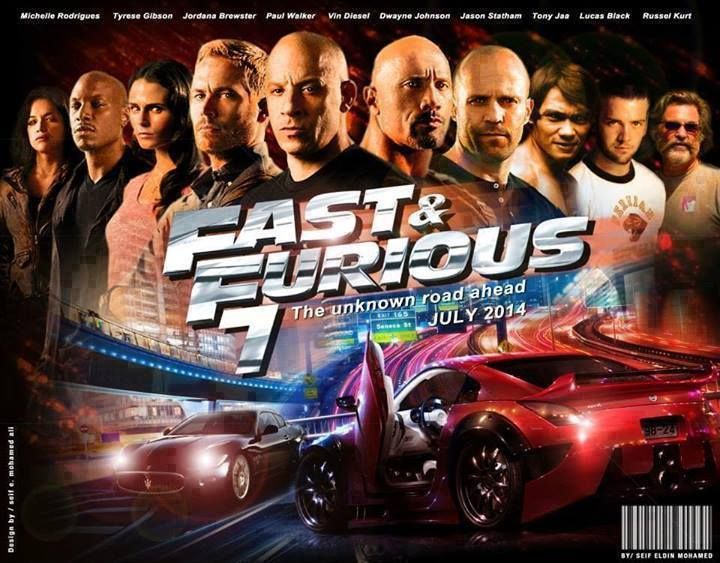
I watched completely numb as Lettie told Dom that she remembered everything. I couldn’t believe that the cruel writers of this movie had killed Dom, and that they still had to find a way to ‘retire’ Brian; how could the franchise continue without its juggernauts? When Dom opened his mouth and said, ‘About time,’ I was still too outraged to feel much relief. The movie was nearly over, the climax was done, so what was going to happen to Brian?
On the beach, Brian is called away from the crew to play with his son in the waves. The others watch him from a distance, noticing that something magical is unfolding on the shore. Dom realises Brian belongs here now with this family, more than with the family he drives with, and that Brian can’t live the ‘ride or die’ life that they’re used to anymore. In this moment, Dom recognises that this is the end of Brian’s life on the road with them. He stands to leave.
‘You aren’t going to say goodbye?’ Ramsay asks.
‘It’s never goodbye.’
The camera lingers for a moment on each character as they watch Brian tossing his son in the air. Their eyes are filled with sadness, not because Brian isn’t going to drive with this crew again, but because they know Paul will never be with them again. In this scene we aren’t seeing characters; we’re seeing the raw emotion of actors reflecting on the death of their friend.
The scene changes to Dom at the wheel of a car similar to the one he favoured in the first Fast and Furious movie. He pulls up at a crossroads and Brian appears alongside him, chastising him for thinking he could leave without a word. He grins, and Dom laughs. The scene fades to black with Dom’s voiceover:
I used to say I lived my life a quarter-mile at a time.
And I think that’s why we were brothers.
Because you did too.
Except this isn’t Dom’s voiceover at all. There is no world in which Dom would never visit his sister and best friend, as well as his niece and nephew, between his adventures driving across the country and the world, but this narration is written in heartbreaking past tense. As a montage filled with images of Brian from the previous six movies appears on the screen, it’s obvious that it isn’t Dom that’s speaking. This scene is Vin Diesel saying goodbye to his best friend, Paul Walker.
You will always be with me.
And you’ll always be my brother.
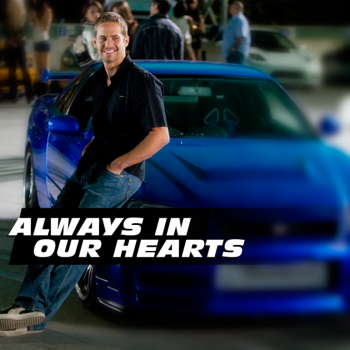 As Brian turns left at a fork in the road and Dom turns right, it became clear that this was always how the character was going to be ‘retired’. Fast and Furious 7 honoured the wishes of the rest of the crew, which were voiced as they said goodbye to Han at the beginning of the movie: no more funerals.
As Brian turns left at a fork in the road and Dom turns right, it became clear that this was always how the character was going to be ‘retired’. Fast and Furious 7 honoured the wishes of the rest of the crew, which were voiced as they said goodbye to Han at the beginning of the movie: no more funerals.
I consider Furious 7 to be an extraordinary example of how expectations based on an audience’s understanding of real life events and prior knowledge can influence a narrative. If this story had been conveyed in any other medium, or if I hadn’t known about Paul Walker and the inevitable retirement of his character from the franchise, then my experience of the same plot would have been remarkably different. I would have experienced less anxiety in each action sequence, I would have felt less sadness as Mia told Brian that he had to come home because she was pregnant with their second child, and I would have cried significantly less the moment I realised how Fast and Furious 7 intended to finish the story. That prior knowledge and my superimposing of real life actors upon their characters gave the narrative more impact.
I had been certain walking into the cinema that Brian would be tragically forced to die doing what he loved, falling alongside Paul Walker; instead, in one of the most heart-warming and heart-breaking final scenes I have ever sat through, they let him live forever.


































